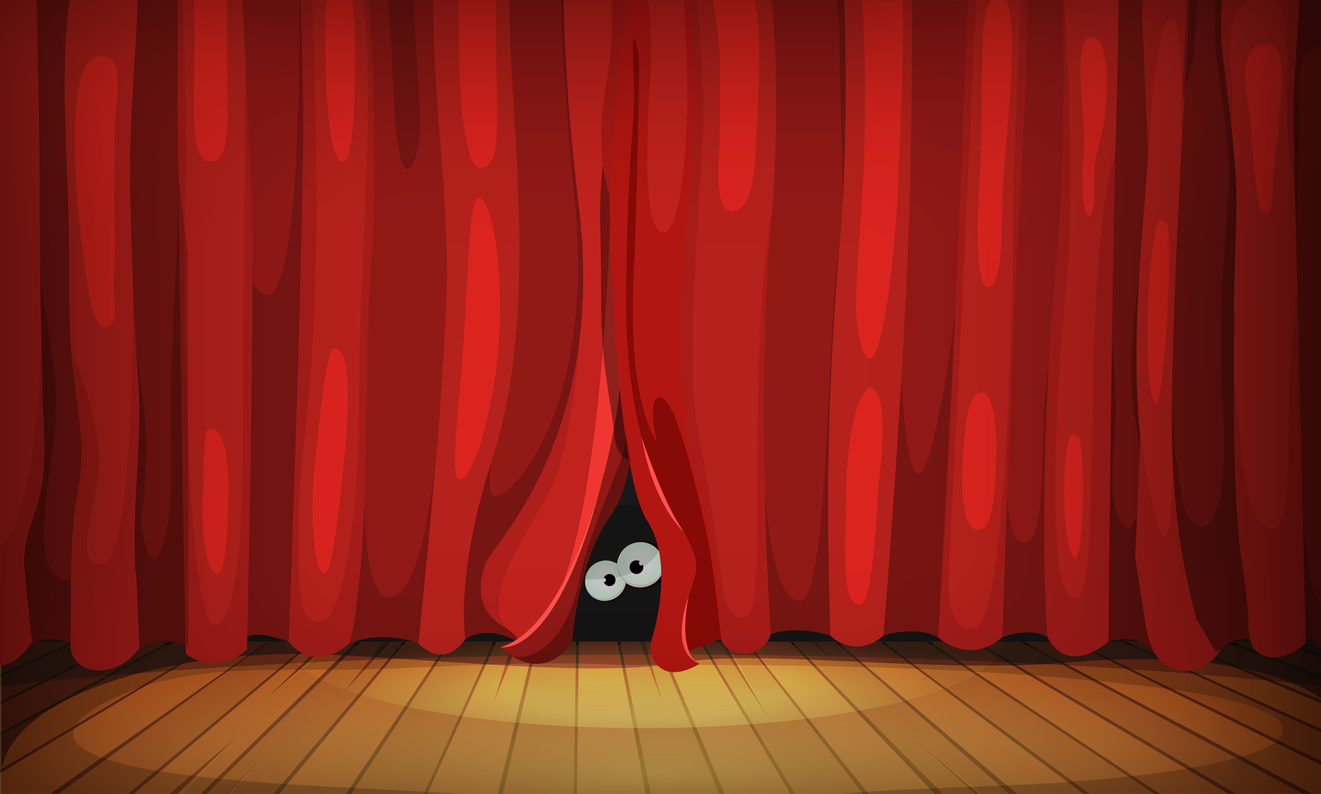Performance Anxiety— Stop It Before It Starts!
There isn’t a week that goes by that one of my voice students doesn’t ask the question: “How do I stop being so nervous to sing in front of people? I have such terrible performance anxiety!” This was especially true this week, as my college voice class students have their upcoming midterm, which entails having to perform a song in front of their peers. My Applied Voice students (the students receiving scholarship one-on-one voice lessons through the college) also have to sing in front of a “jury” of voice professors for their midterm grade. That can certainly be a daunting prospect! My private students at my home studio recently had their annual recital, and some of them had to face their own nerves and anxiety as well.
I’ve been there myself! As a young voice student, and later even as a professional singer, there have been many times when I have had to face performance anxiety. And yet, some nerves are beneficial— those anticipatory “butterflies” that mean you are excited to perform and care about what you are doing. If you step out on stage in a completely lazy and indifferent manner, you shouldn’t be there! A little bit of nervousness can be channeled into your performance energy and give it that extra edge and sparkle. But what voice students and many performers face are debilitating nerves, that actually get in the way of their ability to sing and act!
So, WHY do we get so nervous? And what exactly IS performance anxiety? Let’s tackle the the second question first…
What Is Performance Anxiety?
Performance anxiety is the more updated term for what people used to commonly call “stage fright”. Wikipedia has a good definition: “Stage fright or performance anxiety is the anxiety, fear, or persistent phobia which may be aroused in an individual by the requirement to perform in front of an audience, whether actually or potentially (for example, when performing before a camera)”. Sound familiar? Your heart might start beating furiously, your palms get sweaty, your breathing gets shallow. You may be shaking, and your mouth may get super-dry, or the opposite, you might have too much saliva! Muscles get very tense, and in some cases, a stomach ache or vomiting may occur… And yet, we WANT to sing, we WANT to perform, so WHY are we experiencing this debilitating problem?
Why Do We Get Performance Anxiety?
It would be easy to dismiss this question with a pat answer like “some people are shy” or “some people aren’t cut out to be performers”. In point of fact, many performers are actually introverts in their day-to-day life (me included!), and yet, still have the drive and ability to get up in front of people and sing. So what’s really going on to create such dreaded performance anxiety? I’ve narrowed it down to several main factors.
- Lack of Preparation. Are you really, truly, deep in your heart-of-hearts prepared for your performance? Do you know your song inside-out, backwards and forwards, 1000%? If it’s in a foreign language (or even archaic or poetic English) do you know what every word means? If it’s from an opera, musical, or other larger work, do you know the whole story, who your character is, and the full context in which you are singing the song? Have you worked out all your acting and stage movement (blocking) in advance? If the answer is not a resounding “YES!” you are not completely prepared to perform, and deep down in your soul, you know it, despite what you might superficially tell others (or yourself). This is going to cause performance anxiety, BIG TIME! See my post: How to Find Time to Practice Singing— Even When You Don’t Have Time!
- Lack of Regular Practice. This may seem like a no-brainer, but I am always amazed at how little some students practice, and then think that they are going to have a wonderful performance in spite of it. I call this “wing and a prayer” thinking. Or perhaps you remember the great Broadway musical, The Music Man, where con-man Harold Hill swindles a whole town by telling them that they can learn music by simply using “The Think System”. He says to simply think about “The Minuet in G”, and soon they would be able to play it! Sorry kids, it doesn’t work that way. The truth of the matter is that daily practice is required to develop strength, stamina, coordination, breath control, and a host of other physical and mental processes, in order to sing well. See my posts: Practice Makes Perfect—or Does It and Practice Singing Smarter, for Faster Results! Let’s not forget the memorization of your songs and planning blocking as well. But even MORE than these factors, practicing frequently gives you CONFIDENCE. When you’re ready to step out on stage to perform on Saturday night, you know that you sang successfully on Monday, Tuesday, Wednesday and throughout the week, all the way to the dress rehearsal the day before. So now you’re confident that today will be just as good!
- Lack of Vocal Technique. If you do not have good control over your voice through the use of correct vocal technique (and the regular practice required to develop and maintain it), this will be an albatross around your neck when it comes to performance anxiety. KNOWING that you have direct control over what your voice does at every moment is one of the most powerful and satisfying things about singing. The sense of mastery and ability to craft your vocal tone, expression, phrasing and other important elements of your delivery is key to your confidence on stage. TAKE LESSONS! The more knowledge you have about vocal technique, and the more you apply it to your own voice, the less performance anxiety you will have. You won’t feel like your voice has a mind of its own, and you won’t live in constant fear of something bad happening to your voice while you sing.
- Lack of Experience. Get out there and perform! The more you do it, scary though it may be at first, the more you will calm down and realize that it is slowly getting easier and easier. Each successful experience will build on the last. Even when little things (or even big things) go wrong in a performance, you realize that afterwards you are still alive, your family and friends still love you, and it’s not the end of the world. Seriously. I could write a book about all the unpleasant and sometimes wacky things that have happened in performances. But now I can laugh about them or shrug them off. You can sing in front of your bathroom mirror until the cows come home, and sound fabulous. But the only way to get past having little performing experience in front of an audience is to perform in front of an audience! There’s that special “x-factor” (as I have always called it, long before the TV show) about being in front of people that makes you up your game and truly grow in your singing and performing skills. And as those grow, that confidence spills over into other areas of your life.
- Prior trauma or personal issues. With all due respect, I often half-jokingly say that I should have become a therapist, because in voice lessons I often perform the same function for half the money! Truly, though, our voices are so connected to our emotions and souls, and the ability to open ourselves onstage is a direct result of how comfortable we feel in our own skin. Sometimes I will suggest to a student suffering from serious performance anxiety that they may need more than the listening and support that I can give them in lessons. If someone has had trauma or bad experiences in the past connected to performing, or is suffering from depression, family issues, a bad self-image or other struggles, that is the time to seek professional help. By unraveling the negative effects of these over-arching issues, singers find that their performance anxiety can also lessen as well.
- Physical health issues. If you are dealing with any heath issues that affect singing or any other aspect of your body, this can also be a source of performance anxiety. Something as annoying as allergies may not be an issue for a non-singer, but dealing with them as a performer can be a very real stumbling block to good vocal production, and the confidence in knowing that your voice will be there for you. See my post: Take Care of Your Allergies!* This is also true of acid reflux. See my post: Acid Reflux and Your Voice: Help for a Common Singing Problem* as well as other health issues directly related to singing. But maybe you have other no-so-obvious health issues, like lack of sleep, arthritis, or an eating disorder. From a problem that can be handled on your own, to one perhaps requiring medical intervention, address what needs to be addressed, so that it doesn’t interfere with your singing and create anxiety for you when you perform. See my post: Singers Need A Good Night’s Sleep— How to Get Yours!*
As you can see, performance anxiety is a very real challenge for singers, and one that has at its roots several major sources. You may be suffering from it yourself to some degree! By identifying one or more of the above factors, and taking action to improve the issues involved, you can overcome this very real problem. Not only will your singing and performing skills blossom, but the positive effects will spill over into the rest of your life as well. That’s one of the great things I love about singing performance. It is an art in itself, but it also helps you live your life artfully. Get out there and knock ’em dead!







